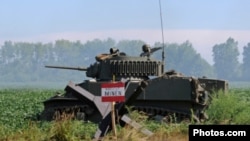The American statesman Benjamin Franklin once wrote "there was never a good war, or a bad peace." The damage done to people and property lingers long after the last shot is fired and bomb dropped. This is particularly true in many parts of Africa, where land mines and other explosive remnants of war still litter the countryside and pose a constant threat.
For more than 15 years, the United States has been a world leader in helping nations deal with this threat, providing $1.8 billion in money and training for conventional weapons destruction programs in more than 80 countries. This month, the U.S. provided additional funding to Guinea-Bissau to help the West African nation clear its hidden killers. The $1 million in new grants to clear and dispose of aging arms and munitions brings to nearly $6 million the U.S. has provided for such efforts there.
As many as 80 different communities in Guinea-Bissau are menaced by anti-personnel mines and other explosives. Most were laid during its brief civil war in 1998-1999, but others date to the earlier war for independence and a spillover from a guerrilla conflict in neighboring Senegal. Since the end of the independence war in 1974, there have been more than 1,200 known landmine casualties. Meanwhile, tens of thousands of hectares of land are too dangerous to use, inflicting a heavy toll on the nation's largely agricultural economy.
America's sustained efforts to help clear these explosive hazards demonstrate its friendship for Guinea-Bissau despite political differences and its genuine concern for the well-being of its people.
The U.S. is providing additional funding to help clear anti-personnel mines and other explosives in Guinea-Bissau.




